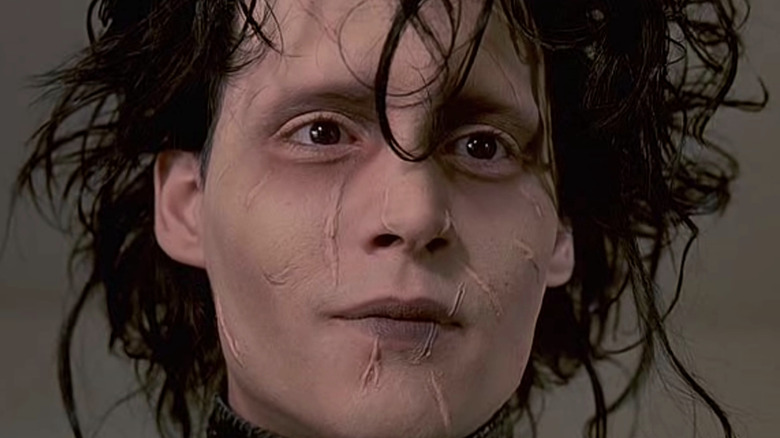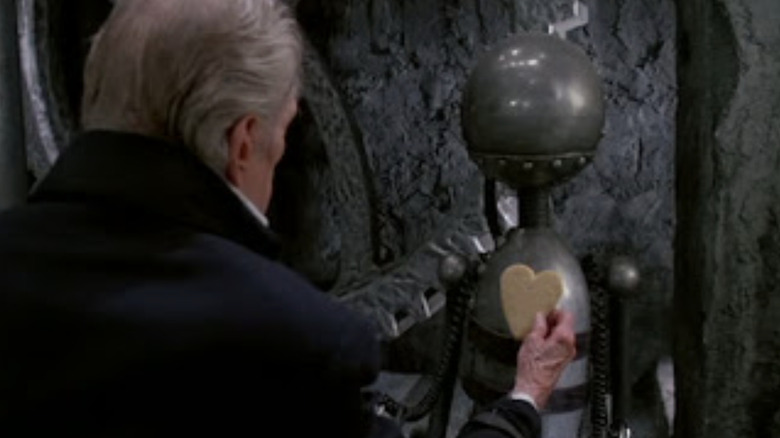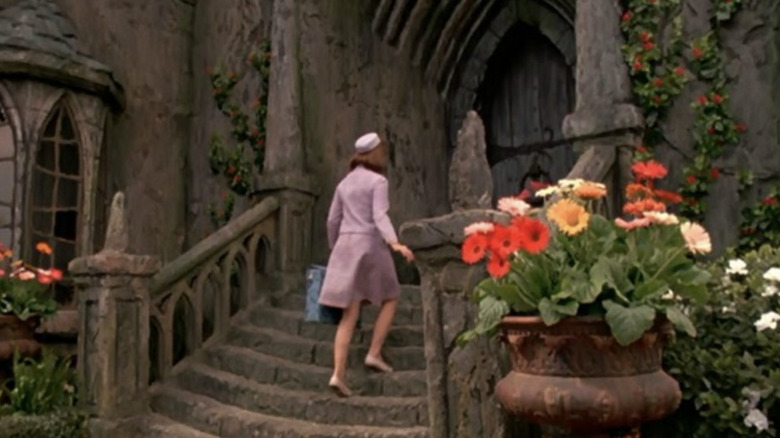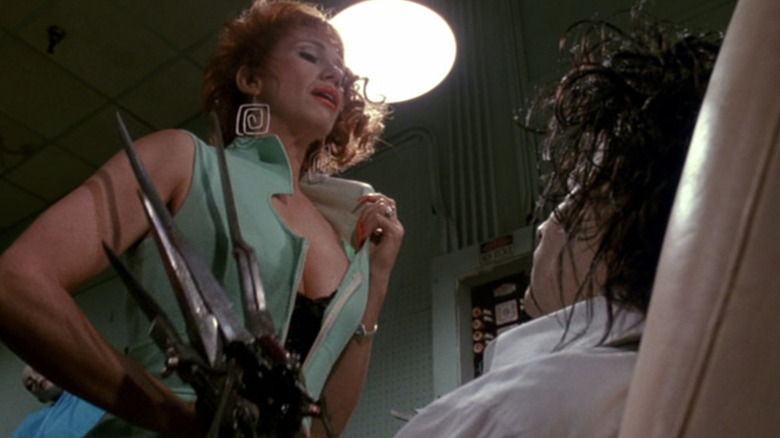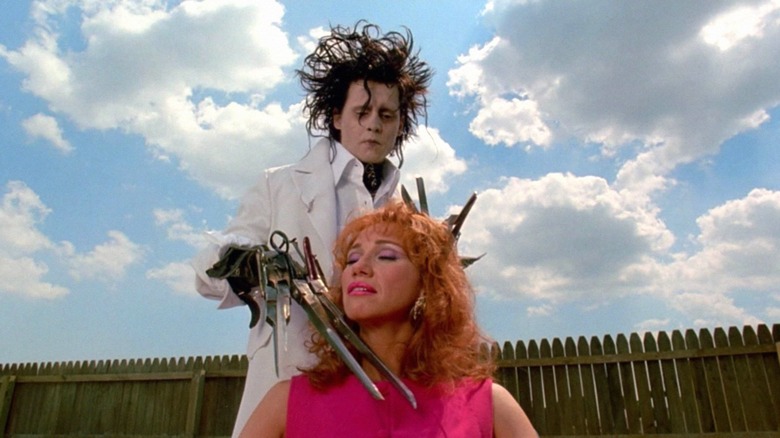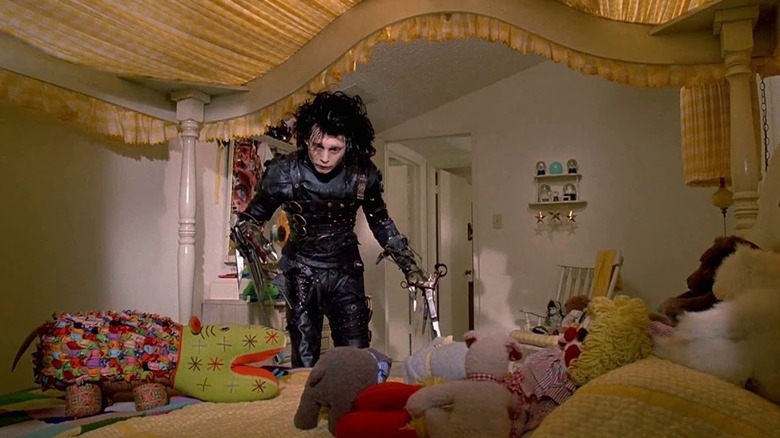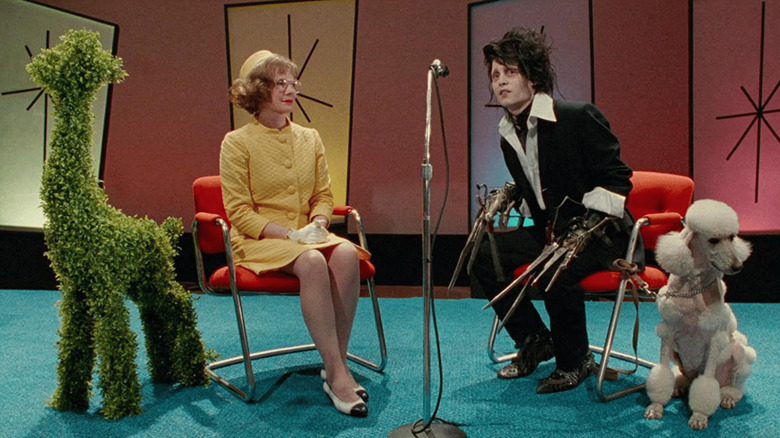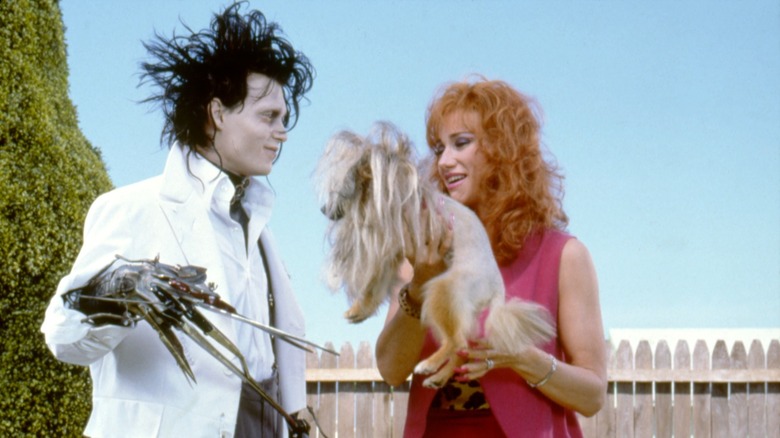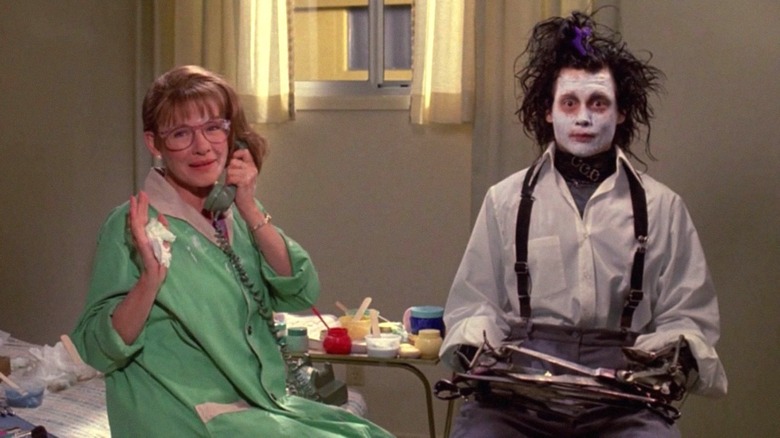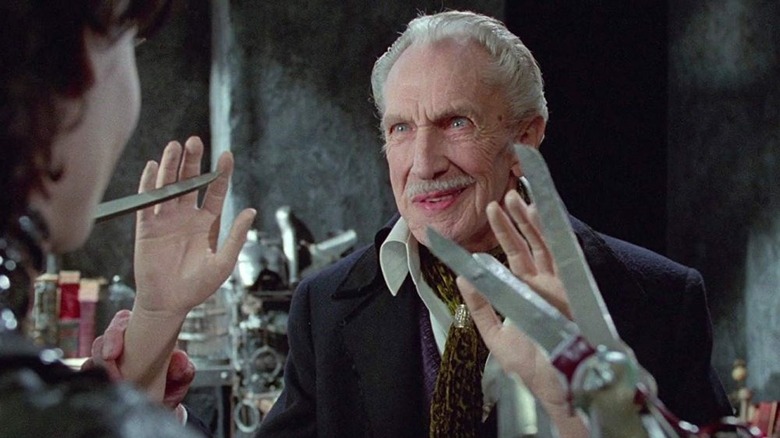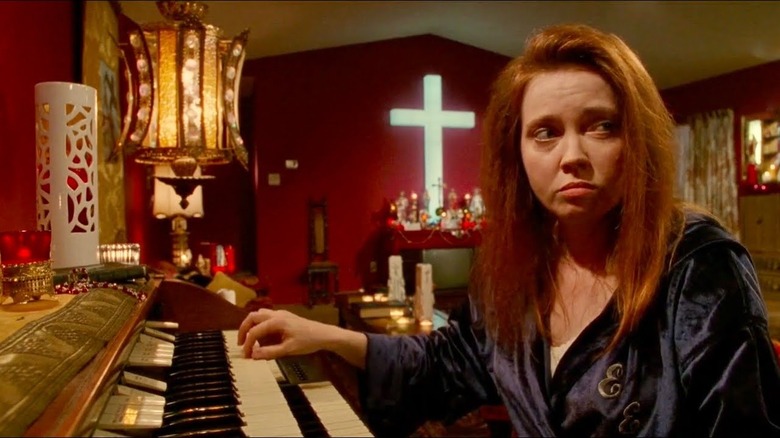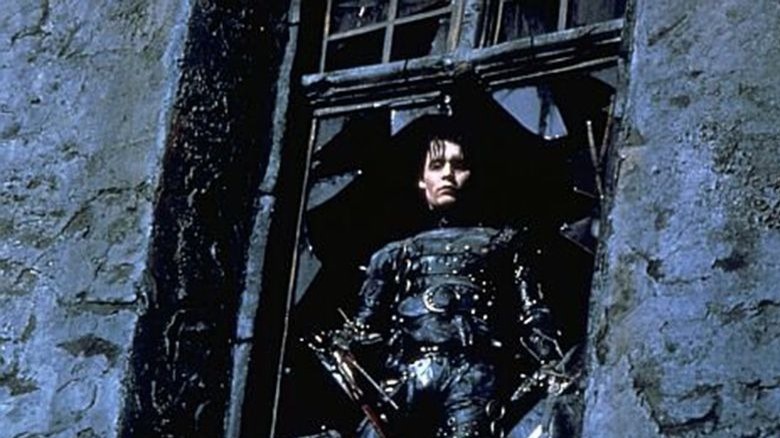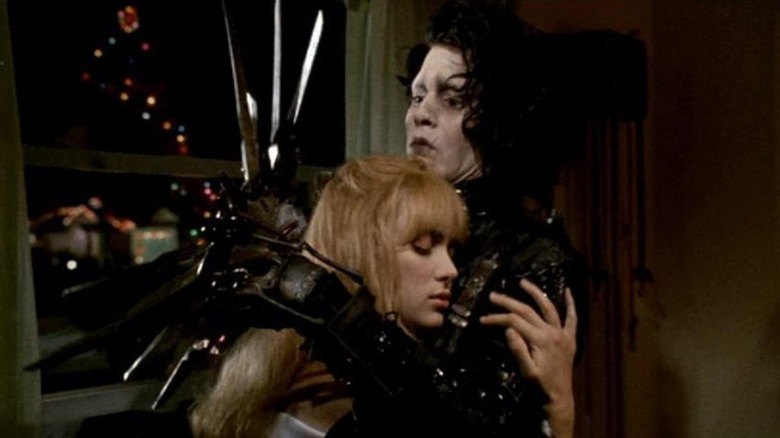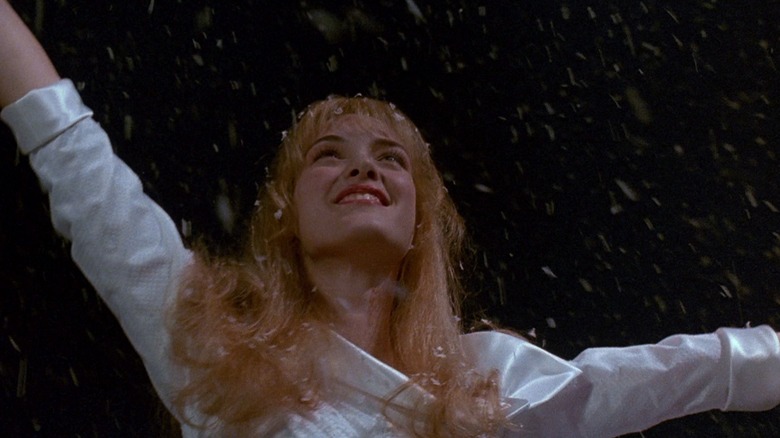Questionable Things We Ignored In Edward Scissorhands
There's no denying that "Edward Scissorhands" was a groundbreaking film for its time back in 1990 and remains an essential fixture in cinematic history today. Who doesn't watch the holiday-centric gothic film during the first snowfall of the year?
When the movie debuted, Winona Ryder had already cemented herself as the queen of dark and gothic films, having starred in "Heathers" and "Beetlejuice" before snagging the role of Kim. Similarly, Johnny Depp had a minor role in "A Nightmare on Elm Street" before winning the title character role, Edward — yes, the one with scissors for hands. Of course, the project introduced Depp to Tim Burton, initiating their long intertwined careers that boast titles like "Sweeney Todd" and "Corpse Bride."
Though the film is certainly an iconic critique of suburban life, it's still a product of its time period. "Edward Scissorhands" does a great job at calling out the hypocrisy of the status quo, and the cookie-cutter analogy is not subtle given the movie's focus on sugar cookies. However, between its positive spin on multi-level marketing, the egregious depiction of sexual assault, and more than a few plotlines that just don't add up, there are some questionable things we ignored in "Edward Scissorhands." Here they are.
What's the deal with Edward's biology?
The biggest question "Edward Scissorhands" poses is what the heck is Edward's makeup, and how is he sentient? The film half-answers some questions regarding Edward's anatomy in flashbacks of his inventor creating him. We know that he's part machine and part what appears to be human flesh — and he has a sugar cookie for a heart.
The sketches of Edward's design show a hybrid of human anatomy and mechanical components, and Edward himself admits that he's not entirely finished. However, it's abundantly unclear just how much of him is unfinished or what aspects of human anatomy are present in his makeup. Cuts appear to hurt him on the face, and he does bleed, but it's unclear if his body below the neck contains any human anatomy. It seems that the inventor was slowly replacing his mechanical bits with vessels, veins, and other parts of the human body, but for all we know, they could be wires and cords.
Even stranger, Edward eats, but we don't know what happens to his food afterward — especially since his long island iced tea seems to create a gurgling glitch in his mechanics (that he later throws up). However, he seems to be fine eating other food and may even need it, but it's unclear where that food goes or how it's expelled from his body. Edward also doesn't age, making it even more unclear how the inventor pieced him together.
The seedy underbelly of MLMs
Has anyone's ever slid into your DMs with a message along the lines of, "Hey, babe! I have a business opportunity for you"? If so, it would be wise to sprint faster than Edward from the mob of pastel-wearing townspeople. Yet back in the day when Peg was shilling Avon, multilevel marketing representatives took their sales door to door rather than the DMs. Back in the '90s, there was much less awareness about the exploitative nature of these "direct sales" or "network marketing" companies. But there's a reason people liken these companies to scams and pyramid schemes.
If you talk to any MLM rep who isn't in piles of debt, they'll probably tell you that they have a hefty downline — which usually means they swindled desperate people to join their "business venture." According to the Federal Trade Commission, the sad reality is that about 99% of MLM representatives spend more money stocking products than they make selling. Of course, that means their upline is lining their pockets while the rest of the boss babes struggle to pay rent.
In "Edward Scissorhands," Peg's status as an Avon rep makes it seem like selling is the way they make money rather than recruiting vulnerable people. Her level of desperation to drive sales by going to Edward's shady mansion is a red flag for how scammy the company is. However, it's never addressed in any tangible way. Despite the townspeople rolling their eyes at Peg, the film still makes her Avon plight look sympathetic and romanticized based on how kind and lovely she is. Now, with modern technology, we have anti-MLM Youtubers like Savannah Marie, who frequently do deep dives into specific companies to expose their shady practices.
Joyce is a sexual predator
The following two slides discuss depictions of sexual assault.
Plenty of moments in "Edward Scissorhands" elicit a cringe face, but Joyce's predatory behavior toward the men in the film is downright disturbing. If you go to the scary depths of the internet, you'll find plenty of comments about how attractive she is for her age — but anyone who romanticizes Joyce's behavior needs to rewatch the movie. Notably, she only goes after vulnerable men or those in a power imbalance. There's the handyman in her house, who has to be nice to Joyce to keep his job. Then we have Edward, who has the mentality and socialization of a child, making Joyce's aggressive pursuit of him extra sinister.
Typically, Joyce's advances are met with mild discomfort, but she crosses the line from harassment to assault when she lures Edward to the back room of the salon, forcing a confused Edward to slash open her dress. Edward doesn't fully understand what's happening, making Joyce's predatory advances attempts tantamount to sexual assault. Even worse, she never faces any consequences after Edward flees the scene.
Being bored with your suburban life does not give you the right to take any man you want, and fans would likely view her much harsher if the gender roles swapped. But sexual assault is sexual assault, and nothing else is relevant. Sadly, the dismissal of sexual assault toward men is still common today, and society really needs to work on that. The first step? Stop romanticizing predatory women taking advantage of younger men in film.
Discrediting assault victims
The awful connotations of Joyce's assault don't end there. In addition to forcing herself on Edward, she quickly fabricates the narrative of what really happened the minute he rejects her. Joyce twists the events in her favor, claiming that Edward attempted to take advantage of her. While this scene seems like a typical trashy thing for a trashy person to do, the connotations go deeper than a vindictive, philandering housewife.
Joyce's story arc lends credence to the "women are lying about sexual assault" defense that's frequently used to discredit survivors of sexual assault. Whether people watching the movie realize it or not, that kind of subliminal messaging leaves a mark. In fact, this was a fairly common trope for the time and undoubtedly led to a significant amount victim-blaming and "what were they wearing" comments. Joyce never gets called out for this behavior, either, despite the townspeople frequently touching, groping, and moaning to men who did not consent to this behavior.
If you or anyone you know has been a victim of sexual assault, help is available. Visit the Rape, Abuse & Incest National Network website or contact RAINN's National Helpline at 1-800-656-HOPE (4673).
Waterbeds don't work like that
There are quite a few technical details in "Edward Scissorhands" that don't make much sense, but one of the biggest head-scratchers comes when Edward pokes a hole in Kim's water bed. He manages to stop the onslaught of water by placing a stuffed animal over the hole and continues to use the bed with no issues. Eventually, he stabs it multiple times, and only then does the bed become unusable as water sprays everywhere. The scenes are obviously there for the aesthetic, but that bed would have been a goner on day one.
Even weirder, why would you throw a guy with scissors for hands in the one room with a water bed? Not only does it belong to a teenage girl, but the basement seems like a much less disastrous choice from the jump. In addition to the basement bed being unused, it's also ... not made of water.
A muddled time period
What time period does "Edward Scissorhands" even take place in, anyway? The '90s movie is all over the map regarding wardrobe, sets, stylistic choices, and the movie's influences. On the one hand, technical details like the cars align with the film's 1990 release. However, other elements are much more contradictory. When Edward appears on a talk show, the background is straight out of a '60s or '70s game show. Did we travel back in time to hang out on the set of the OG version of "The Dating Game"? Peg's look in that very same scene doesn't particularly match the late '80s or early '90s trends, either.
Meanwhile, the Stepford aspect of the cookie-cutter neighborhood gives off a very '50s vibe with the same-looking pastel conformist houses. At first, if you ignore some of the classic '90s details like the cars, you may think that Kim is an older woman in 1990 when the movie comes out and her life with Edward all those years ago took place way in the past (rather than her telling the story from the future). Yet neither theory fully works because the timeline itself is so unclear, and the events seem to pull from so many decades.
However, we're learning the events of the film through an older woman recalling her teenage years to her granddaughter. That's not exactly grounds for the most reliable narrator. It's reasonable to assume that Kim's memory could be displacing some of the trends from various decades — especially since she didn't personally experience Edward's arrival and would have heard those details secondhand.
A shiny new toy for bored suburbians
The townspeople use and abuse Edward when he's something shiny and new, but they immediately rescind that acceptance when it's no longer convenient for them. The women in the film happily let Edward trim sculpt their hedges, cut their dog's hair, and even style their own. And while most people wouldn't be caught dead showing off some of the hideous hairdo's Edward gives them, they're all thrilled with the final product. Yet why don't they pay him? Bill asks this very question, but the answer is simple: Why pay someone for a service when you can manipulate them into doing it for free?
During Edward's TV interview, an audience member asks what will make Edward special if he gets his scissor hands removed. Edward clearly isn't a person to these people — he's a thing, a commodity. His otherness is precisely what makes him intriguing. Still, he's only allowed to be just different enough to the point where it doesn't disrupt any of the townspeople's meticulously curated version of reality. Even the army veteran at the beginning of the film who relates to Edward and tells him not to let other people make him feel "other" joins the mob mentality in chasing him out of town. The exploitation of Edward is real — from failing to pay him for services to not helping him start the business they've all benefited from, all while treating him like a show pony.
A love affair with superficiality
Superficiality is the name of the game when it comes to the townspeople in "Edward Scissorhands." Not even our kindhearted protagonist Peg is immune from society's focus on beauty and perfection. Sure, she doesn't judge Edward, and her compassion is inspiring, but one of the first things she attempts to do is "fix" Edward's scarred face. He never gives her any reason to think his "imperfections" bother him, but with her Avon briefcase in her hand, she makes it her personal mission. Indeed, she's more concerned with covering his face than finding a way for him to stop accidentally cutting it.
Everything from the townsfolk's perfectly manicured lawns, encouragement of Edward's shrub sculptures, embracing of his wild hairstyles, and even how the women in the film carry themselves lends credence to this obsession with how things look. And, of course, when one person does something different, the rest must follow suit. Additionally, the townswomen collectively have the goal to make Edward normal while simultaneously getting a thrill out of his otherness.
It's clear that the film is a critique of this suburban contradiction. Yet, given that none of the characters face the consequences for forming a mob and chasing a guy out of town when they get bored of him, the message is more nuanced than it could be. That's not necessarily a bad thing, and it's certainly a reality, but it would be nice to see one secondary character have a revelation about their behavior and leave a glimmer of hope for humanity.
Why is Edward's existence a surprise?
It's no secret that "Edward Scissorhands" is filled with more than a few plot holes that fans can't plug up with an errant stuffed elephant. One of the most confusing aspects of the movie is that an inventor lived up in a creepy mansion creating wild machinery and humanoids, and no one knew his backstory (or Edward's). Their mansion looms tall over the town right in its backyard, and with a community that loves to gossip this much, it's wild that theories weren't running amock at the very least. Why wasn't Edward's story seeped into town lore and campfire stories?
We know that Edward doesn't age, so he could have been up there alone for decades before Peg finds him. Still, it's not believable that rumors of "the strange scissors boy who lives in the haunted mansion" wouldn't make their way to the townspeople. His arrival (and existence) shouldn't be entirely a surprise. Even more disturbingly, we never find out what happened to the inventor's body. Since Edward and the inventor lived in the mansion alone, and Edward doesn't really have the means (or hands) to bury him without making the scene a bloodbath, there are some pretty disturbing connotations as to what happened (or didn't happen) to the body. This all feels very Norman Bates-y.
Mental health is important
A whole lot of characters in the movie could benefit from a therapy session, which is nothing to be ashamed of. Edward is an obvious candidate given his unquantified yet substantial years of isolation that even the police station psychologist takes note of. However, there's another townsperson who could really use some mental health services: Esmeralda.
We see Esmeralda display multiple paranoid delusions that take religious undertones throughout the film — something common with schizophrenia patients. Many times, paranoia takes the form of something deeply ingrained in someone's life and psyche, which is why religious undertones are so common. Now, it doesn't do anyone any good to speculate what mental health conditions a movie character may or may not experience. Still, everyone just blows Esmeralda off as the "crazy eccentric lady" instead of actually getting her any help. At first glance, we tend to view Esmerelda as a villain, but she's just as much of a victim to this vapid society as Edward.
If you or someone you know is struggling with mental health, please contact the Crisis Text Line by texting HOME to 741741, call the National Alliance on Mental Illness helpline at 1-800-950-NAMI (6264), or visit the National Institute of Mental Health website.
Edward pays the price
Despite all of the horrid behavior of the townspeople, Edward is the one who ends up locked up for eternity — forced to face the same loneliness that caused his inventor to create a child out of gears, switches, and a sugar cookie heart. After they've gotten their fill using and exploiting Edward, the townsfolk are more than happy to run him out of town with everything short of pitchforks. In fact, the only other character to face any consequences is Kim's homicidal ex-boyfriend, who almost got her brother killed and pushed her around before trying to kill Edward. However, Jim's death is nothing compared to Edward's sentence.
Most people would probably say that hours of a fully lived life are better than an endless supply of solitary confinement like Edward faces alone in his mansion. There's a reason psychologists call solitary confinement torture — being lonely and touch-starved with zero contact with anyone or anything is almost a fate worse than death, especially when you live forever. Edward lives out his days sad, alone, and confused, simply because he became the scapegoat for everyone else's bad behavior. Some justice would have been a welcome relief.
Kim just bails on Edward
Speaking of endless solitary confinement, why does Kim never visit Edward? There's no reason she couldn't sneak up to see him or help him escape to somewhere safer once some time has passed and the vultures picked something new to fixate on. Sure, there would never be a place for him in this cookie-cutter hellscape, but the world is a big wide-open place. What was stopping Kim from getting Edward the hell out of Dodge?
Sure, Edward needs to get lost in the moment when the mob chases him. But if Kim wanted to, she could have gotten him in touch with one of those doctors the town kept boasting about. They could have given him hand prosthetics or even just taken his scissor gloves off so he could stop putting himself and others at risk. No one would know his history in the outside world, and he could start a new life for himself — even if Kim didn't join him. It sure beats getting locked in a mansion for eternity.
Additionally, superficiality rears its ugly head again when Kim's granddaughter suggests seeing Edward after all of this time, and Kim laments that she wants him to remember her as she is. Her fixation on youth and beauty doesn't erase Edward's life sentence of a hollow, lonely existence, but seeing her might — if only for a minute.
That creepy haunted house on the hill
Once again, it makes no sense that Edward's survival could remain a secret so close to the gossipy town after all of this drama and supposed death. A decade or two after the events of Edward's arrival, there's no way local kids wouldn't go snooping around what is supposedly a haunted mansion. With the way the townspeople gossip, wild, outrageous stories would definitely go around about the violent ageless man with scissors for hands who killed an innocent boy from town. That's definitely the tale that would fly out of the local gossips' mouths.
In a small town like this, neighborhood teens and kids have a lot of free time and an excess of pent-up energy. They would undoubtedly go up to the mansion to investigate the site of two grisly murders, and Edward's survival would be outed — only for the initial events to play on repeat. That's why it makes no sense that Kim didn't rescue him when she could. The mansion is a prime creepy hookup and hangout spot, and someone at some point would take a dare to explore. And at that point? The Magic 8 Ball says, "outlook not so good" when it comes to Edward's survival.
